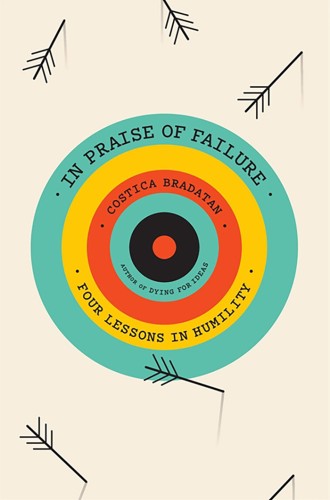Down to earth
For philosopher Costica Bradatan, failure delivers self-knowledge in a way that success cannot.
In reviewing this book, it is hard to resist quoting Bob Dylan’s 1965 hit “Love Minus Zero/No Limit”: “She knows there’s no success like failure / And that failure’s no success at all.” Applying Dylan’s ironic lyric as a hermeneutical prompt produces this summary of the book: there’s no success like failure, because failure alone reveals the broken truth about ourselves and our world.
A philosopher who teaches at Texas Tech University, Costica Bradatan examines failure from four vantage points: metaphysical, political, personal histories, and our ultimate and inevitable demise, namely, death. With special attention to the Gnostics, Bradatan opens the curtain on a chorus of thinkers who, rather than marvel at the glory of creation, shake their heads in disgust. Quoting historian Jacques Lacarrière, Bradatan writes, “Every single thing in the world . . . carries the ‘materially traceable trace of an original imperfection.’”
Read our latest issue or browse back issues.
Since our lives are bound together, the author pays homage to the “ruins of political failure,” with reference to the harrowing machines of the Nazis and the Soviets. Born and raised in Romania, Bradatan possesses an intimate knowledge of the world in which executions, torture, and the gulag were only a whisper away. Like Hitler, when Stalin had someone arrested, just for terror and fun’s sake, he would also have a close personal relative of that doomed individual sent into slave labor. Stalin made frequent jokes about the millions of lives he destroyed. Bradatan signs off on this section with a sigh: “One wonders whether the caveman was capable of such refined savagery.”
In Praise of Failure is consistent with the Nietzschean position that enduring the slings of life requires a “why.” Given the moribund possibility of faith, Bradatan notes that “with God in the shadows, people will flock to the charismatic politician who gives them even an illusion of meaning.” This is the case no matter how stupid or evil that politician might be, the silent plea being, Just give me some sense of meaning.
One of Bradatan’s literary heroes and a central figure in this text is Emil Mihai Cioran, the Romanian nihilist who wrote in French with the hammerblows of a Nietzsche on steroids. For a sample of the titles of Cioran’s lapidary works, take The Trouble with Being Born and A Short History of Decay. During the years Hitler came to power, Cioran wrote, among many similar comments: “If I like something about Hitlerism, it is the cult of the irrational, the exaltation of pure vitality, the virile expression of strength, without any critical spirit, restraint or control.” In other words, the political realm is such a lifeless failure that almost anything would be an improvement.
Why kudos to failure? Bradatan explains: “When you can’t insert yourself into the flow of things, and any dealing with the world brings you so much discomfort, you are uniquely positioned to observe its course.” From this stance, he continues, “your clumsiness puts a distance between you and the world, and the depth of your insight is in direct proportion to that distance.” In other words, failure delivers self-knowledge in a way that success cannot.
The subtitle of the book is Four Lessons in Humility. Bradatan’s analysis of humility is anchored in his genealogy of the term, which is derived from the Greek and Latin words for earth. Failures bring you down to earth, Bradatan writes. To be humble is to be in contact with reality, to have your feet grounded in the truth—and failure is the path.
According to the author’s anthropology, we are storytelling, self-narrating creatures. In fact, the final sentence of the text reads, “Without stories, we would be nothing.” How do our stories and our failures intersect? Suppose that the story you tell yourself about yourself is that you were born to be a writer. Let us further suppose that after a few years and an endless series of rejection letters, your failures reveal that at your core you never had any genuine desire to be a scribbler. If anything, you discover as you revise your story that what you craved was your father’s admiration.
The conviction that we are storytelling bipeds determines Bradatan’s method of structuring his paean in the form of a catena of personal tales of historical figures who were simultaneously spectacular failures and striking successes. The main subjects in Bradatan’s portrait gallery are Cioran, Simone Weil, Mahatma Gandhi, Seneca, and Yukio Mishima.
For readers who are not students of history, there is much demythologizing in these vignettes. For example, did you know that Gandhi wrote a number of friendly letters to Hitler suggesting the Jews ought to let themselves be slaughtered? Seneca, that paragon of Stoic philosophy, was one of the richest men in the empire and a longtime henchman for Nero. Some of Bradatan’s subjects, such as Weil, Mishima, and Gandhi, were grandiose exhibitionists about their blunders. (The loin-clothed lawyer memorably referred to his own mistakes as “Himalayan failures.”) Perhaps Dostoevsky was right when he hinted that pathological conditions are required to face the truth. In any case, many of Bradatan’s stories made me wonder about the sanity of these world historical figures.
There are failures, and then there are failures. It is hard to grasp how a moral failure is deserving of praise when it does not lead to a redemptive insight and change. Nor is it clear why the likes of the Holocaust might merit a quiet round of applause, unless perhaps it is by way of teaching us the profound madness we are capable of and, as a corollary, our desperate need for just institutions that keep a manhole cover on our demons.
These questions aside, I am sorry to say that this highly creative member of the philosophy guild does not deserve the praise of failure. He has an encyclopedic knowledge combined with the gift of a master storyteller who knows how to stay out of the weeds. His prose is limpid and calm but spiced with just the right dash of irony. Most chapters move gracefully along, with switchbacks between a tale about one blunderer and a story about another. A rarity, In Praise of Failure is at once a substantial history of ideas and a page-turner.






